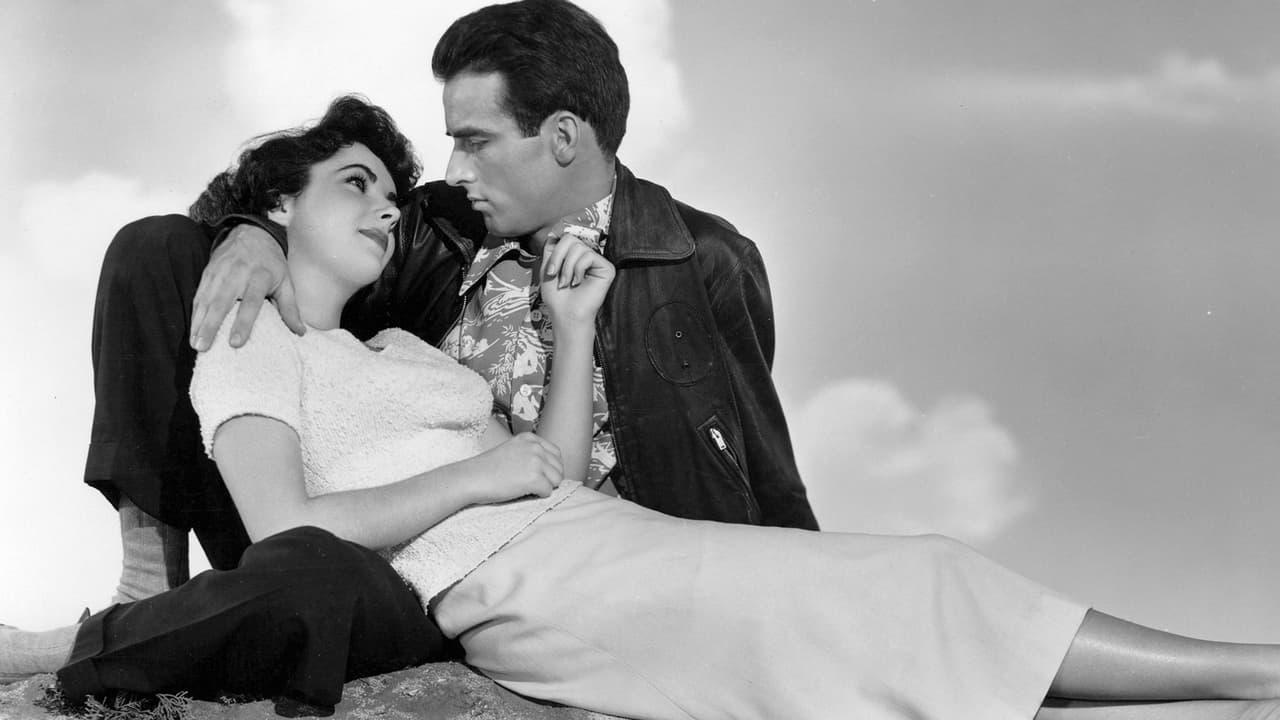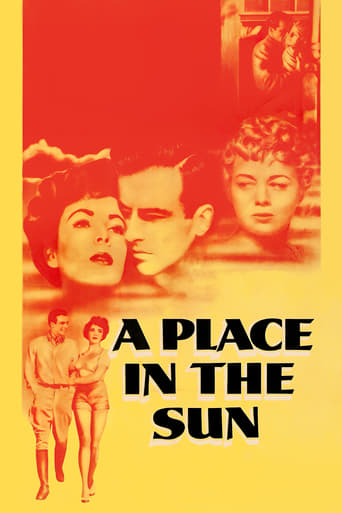frankwiener
Alert: This review may contain spoilers.This film is based on Theodore Dreiser's classic novel, "An American Tragedy", so don't expect a comedy. Dreiser was inspired by the true 1906 murder of Grace Brown by Chester Gillette at Big Moose Lake in the Adirondack Mountains of upstate New York. Chester was employed at his family's woman's apparel factory in the town of Cortland, and the trial occurred in the nearby town of Herkimer, New York. Although the film was shot at three different lakes in California, including Tahoe, there is no reason to believe that director George Stevens intended to change the locale of the novel from two small, industrial mill towns in upstate New York to California as several reviewers here believe to be the case. According to my research, California never had an electric chair but New York did.As the beginning of the massive 800 page novel is missing from the movie, some essential information is omitted, possibly by design, that exposes very early the central character's very weak moral foundation, a highly ironic circumstance when we consider that his parents had devoted their entire lives to saving lost souls in their urban American religious mission. As a result, the viewers are forced to judge George's moral character on their own as events unfold before them, and this, at times, can be a true mental challenge.Like the real-life Chester Gillette, George Eastman (Montgomery Clift), of poor and humble background, is hired on the assembly line of his family's apparel factory and, defying strict company policy, becomes sexually involved with a co- worker, the plain, dowdy, whining, and downright annoying Alice Tripp (Shelley Winters), impregnating her somewhere along the way. In the meantime, George is promoted to an office position and gains entry to the aristocratic social circles of his wealthy, industrialist relatives, where he meets the beautiful, outgoing, and sophisticated Angela Vickers (Elizabeth Taylor). From the start, George and Angela are strongly attracted to each other and director Stevens, who deservedly won an Oscar for this film, highlights the passionate intensity of their relationship by the use of extreme close-up and a dreamlike musical accompaniment that becomes their mystifying, other worldly theme song for the rest of the picture. Well done, George Stevens!Now carrying his child, frumpy and irritating Alice threatens to expose him instantly to his newly gained, elite society unless he immediately marries her. Instead, George decides to row her out to an isolated section of Loon Lake where he plans to drown her. In the rowboat, Alice becomes agitated and accidentally capsizes the boat on her own. The viewers never witness George deliberately acting to harm her, and we never see him exerting any effort to save her either.Instead of coming clean with the authorities about the incident, as he should have, George flees from the scene and attempts to hide his involvement but is soon caught and implicated in her death. The District Attorney (Perry Mason--oh sorry, Raymond Burr!) is determined not only to convict George of murder but to send him to the electric chair (NY, folks, not CA!). Unfortunately for George, the DA's ruthless obsession, the mounting circumstantial evidence, the prevailing working class sentiments of the town, and his own testimony on the stand combine to persuade the jury against him.Ms. Winters, who was nominated for an Oscar for her role here, so successfully creates Alice as a walking stick of chalk screeching across a slate blackboard that she even tests the moral fiber of the viewer during George's decision making process of what the heck to do with her. In the rowboat, the prospect of spending his life with Alice rather than Angela is absolutely excruciating torture. I felt this intensely, but I still would have come clean about the incident with the authorities rather than running away, as George did. Would I have tried to find Alice under the water? Maybe for a few minutes. The role of Alice Tripp was only the start of a long and very successful string of somewhat unsympathetic, disagreeable characters for Shelley Winters, including those of "Lolita", "Diary of Anne Frank" (Oscar winning), and "Patch of Blue" (Oscar winning), only to mention a few. In this film, she found her true calling as an actor. Good for you, Shelley.If George didn't decide to break strict company rules, a very small and seemingly insignificant act, his life might have turned out very differently, but he was somehow fated for this end. Regardless of the specific turn of events, I was led to believe that he would have ended up in the very same place. How about you?
hamoo
i agonized for quite some time debating whether another review was warranted. is there anything that i could add that hasn't been said? yes: 1. that george eastman could be any one of us at some point in our lives - a hot mess. and this is where it hits home. i suspect the negative reviews of apits is founded upon the maxim: "if you spot it you got it". men are uncomfortable with seeing that in themselves. the only other equal to this movie could possibly be the talented mr. ripley. 2. there was a synopsis that said alice tripp latched on to george eastman like a vice. unfortunately, this is true. after she found out that george is a coward, a liar, and a cheater, alice should have walked away. but that's easy for me to say. i don't have to raise a child on my own. part of what makes this such a great movie is that alice is a trusting, sweet, young, and beautiful woman. only a fool would walk away from that, and this is exactly where i can relate. i want to say that a lying, cheating, coward is going to get his comeuppance, but then i think which one of us has led a perfect life? not me, that's for sure.
grantss
Brilliant drama. Was going to say "crime-drama" but it is much more than that. Starts out as a romance and general relationship drama and then evolves into something more and a whole letter better. Retains its sense of romance until the end, but throws in many topical issues along the way (validity, or otherwise, of the death penalty being one of them).Excellent plot. The way the movie evolves from a small town human drama to a crime drama and courtroom drama is incredible, and totally unpredictable. Even in the final scene you don't know how things are going to work out.Superb directing from George Stevens. Hitchcockian in some of his uses of camera angles, and Billy Wilder-like in his presentation of human lives and tragedy.The movie will be mostly remembered for the magnetic, sensitive performance from Montgomery Clift. Known for portraying deep, emotional characters, Clift doesn't disappoint here. Plus, here he shows a darker side too. Well deserved his Best Actor Oscar nomination and unlucky not to win.Shelley Winters also deserved her Best Actress nomination for her portrayal of Alice. Played the shy, sweet, unassuming, unpretentious character to perfection.No nomination for Elizabeth Taylor but she lights up the screen in every scene she is in. Stunningly beautiful.Interesting to see Raymond Burr as the District Attorney. Good work by him.A classic.

